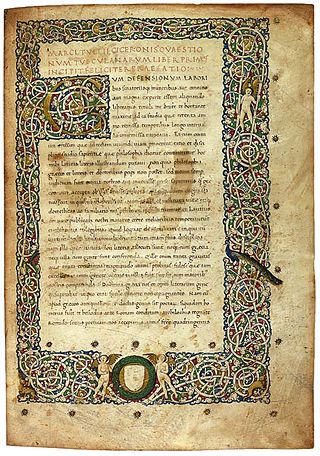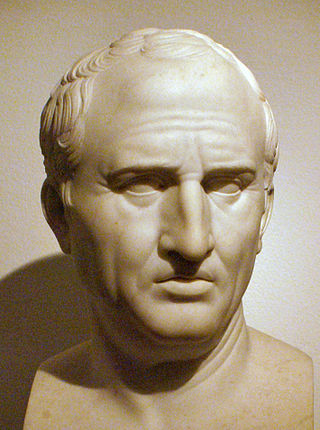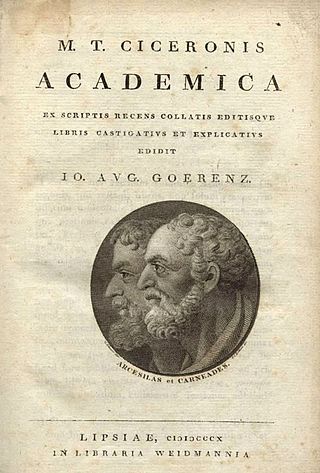Related Research Articles
Q.E.D. or QED is an initialism of the Latin phrase quod erat demonstrandum, meaning "that which was to be demonstrated". Literally it states "what was to be shown". Traditionally, the abbreviation is placed at the end of mathematical proofs and philosophical arguments in print publications, to indicate that the proof or the argument is complete.

Zeno of Citium was a Hellenistic philosopher from Citium, Cyprus. He was the founder of the Stoic school of philosophy, which he taught in Athens from about 300 BC. Based on the moral ideas of the Cynics, Stoicism laid great emphasis on goodness and peace of mind gained from living a life of virtue in accordance with nature. It proved very popular, and flourished as one of the major schools of philosophy from the Hellenistic period through to the Roman era, and enjoyed revivals in the Renaissance as Neostoicism and in the current era as Modern Stoicism.

Michel Eyquem, Seigneur de Montaigne, commonly known as Michel de Montaigne, was one of the most significant philosophers of the French Renaissance. He is known for popularizing the essay as a literary genre. His work is noted for its merging of casual anecdotes and autobiography with intellectual insight. Montaigne had a direct influence on numerous Western writers; his massive volume Essais contains some of the most influential essays ever written.
Crantor of Soli was an Ancient Greek philosopher and member of the Old Academy who was the first philosopher to write commentaries on the works of Plato.

The designation "Renaissance philosophy" is used by historians of philosophy to refer to the thought of the period running in Europe roughly between 1400 and 1600. It therefore overlaps both with late medieval philosophy, which in the fourteenth and fifteenth centuries was influenced by notable figures such as Albert the Great, Thomas Aquinas, William of Ockham, and Marsilius of Padua, and early modern philosophy, which conventionally starts with René Descartes and his publication of the Discourse on Method in 1637.
Hicetas was a Greek philosopher of the Pythagorean School. He was born in Syracuse, Magna Graecia. Like his fellow Pythagorean Ecphantus and the Academic Heraclides Ponticus, he believed that the daily movement of permanent stars was caused by the rotation of the Earth around its axis. When Copernicus referred to Nicetus Syracusanus in De revolutionibus orbium coelestium as having been cited by Cicero as an ancient who also argued that the Earth moved, it is believed that he was actually referring to Hicetas.

The Essays of Michel de Montaigne are contained in three books and 107 chapters of varying length. They were originally written in Middle French and published in the Kingdom of France. Montaigne's stated design in writing, publishing and revising the Essays over the period from approximately 1570 to 1592 was to record "some traits of my character and of my humours." The Essays were first published in 1580 and cover a wide range of topics.

Zeno of Sidon was a Greek Epicurean philosopher from the Seleucid city of Sidon. His writings have not survived, but there are some epitomes of his lectures preserved among the writings of his pupil Philodemus.
Antiochus of Ascalon was an 1st-century BC Platonist philosopher who rejected skepticism and blended Stoic doctrines with Platonism as the first philosopher in the tradition of Middle Platonism.

The Tusculanae Disputationes is a series of five books written by Cicero, around 45 BC, attempting to popularise Greek philosophy in Ancient Rome, including Stoicism. It is so called as it was reportedly written at his villa in Tusculum. His daughter had recently died and in mourning Cicero devoted himself to philosophical studies. The Tusculan Disputations consist of five books, each on a particular theme: On the contempt of death; On pain; On grief; On emotional disturbances; and whether Virtue alone is sufficient for a happy life.
Catius was an Epicurean philosopher, identified ethnically as an Insubrian Celt from Gallia Transpadana. Epicurean works by Amafinius, Rabirius, and Catius were the earliest philosophical treatises written in Latin. Catius composed a treatise in four books on the physical world and on the highest good. Cicero credits him, along with the lesser prose stylist Amafinius, with writing accessible texts that popularized Epicurean philosophy among the plebs, or common people.

Francisco Sanches was a skeptic, philosopher and physician of Sephardi Jewish origin, born possibly in Tui, Spain or probably in Braga, Portugal.
Stoic passions are various forms of emotional suffering in Stoicism, a school of Hellenistic philosophy.

De Natura Deorum is a philosophical dialogue by Roman Academic Skeptic philosopher Cicero written in 45 BC. It is laid out in three books that discuss the theological views of the Hellenistic philosophies of Epicureanism, Stoicism, and Academic Skepticism.
Diodorus of Tyre was a Peripatetic philosopher, and a disciple and follower of Critolaus, whom he succeeded as the head of the Peripatetic school at Athens c. 118 BC. He was still alive and active there in 110 BC, when Licinius Crassus, during his quaestorship of Macedonia, visited Athens. Cicero denies that he was a genuine Peripatetic, because it was one of his ethical maxims, that the greatest good consisted in a combination of virtue with the absence of pain, whereby a reconciliation between the Stoics and Epicureans was attempted.

The writings of Marcus Tullius Cicero constitute one of the most renowned collections of historical and philosophical work in all of classical antiquity. Cicero was a Roman politician, lawyer, orator, political theorist, philosopher, and constitutionalist who lived during the years of 106–43 BC. He held the positions of Roman senator and Roman consul (chief-magistrate) and played a critical role in the transformation of the Roman Republic into the Roman Empire. He was extant during the rule of prominent Roman politicians, such as those of Julius Caesar, Pompey, and Marc Antony. Cicero is widely considered one of Rome's greatest orators and prose stylists.
Rabirius was a 1st-century BC Epicurean associated with Amafinius and Catius as one of the early popularizers of the philosophy in Italy. Their works on Epicureanism were the earliest philosophical treatises written in Latin. Other than Lucretius, Amafinius and Rabirius are the only Roman Epicurean writers named by Cicero.
Hortensius or On Philosophy is a lost dialogue written by Marcus Tullius Cicero in the year 45 BC. The dialogue—which is named after Cicero's friendly rival and associate, the speaker and politician Quintus Hortensius Hortalus—took the form of a protreptic. In the work, Cicero, Hortensius, Quintus Lutatius Catulus, and Lucius Licinius Lucullus discuss the best use of one's leisure time. At the conclusion of the work, Cicero argues that the pursuit of philosophy is the most important endeavor.
On Passions, also translated as On Emotions or On Affections, is a work by the Greek Stoic philosopher Chrysippus dating from the 3rd-century BCE. The book has not survived intact, but around seventy fragments from the work survive in a polemic written against it in the 2nd-century CE by the philosopher-physician Galen. In addition Cicero summarises substantial portions of the work in his 1st-century BCE work Tusculan Disputations. On Passions consisted of four books; of which the first three discussed the Stoic theory of emotions and the fourth book discussed therapy and had a separate title—Therapeutics. Most surviving quotations come from Books 1 and 4, although Galen also provides an account of Book 2 drawn from the 1st-century BCE Stoic philosopher Posidonius. Little or nothing is known about Book 3.

The Academica is work in a fragmentary state written by the Academic Skeptic philosopher, Cicero, published in two editions. The first edition is referred to as the Academica Priora. It was released in May 45 BCE and comprised two books, known as the Catulus and the Lucullus. The Catulus has been lost. Cicero subsequently extensively revised and expanded the work, releasing a second edition comprising four books. Except for part of Book 1 and 36 fragments, all of the second edition has been lost. The second edition is referred to as Academica Posteriora or Academici Libri or Varro.
References
- ↑ Smith, M., (2001), On the Nature of Things, page x. Hackett Publishing.
- ↑ Cicero, Academica, i. 2, Tusculanae Quaestiones, iv. 3.
- ↑ Cicero, Tusculan Disputations: (C)um interim illis silentibus C. Amafinius extitit dicens, cuius libris editis commota multitudo contulit se ad eam potissimum disciplinam, sive quod erat cognitu perfacilis, sive quod invitabantur inlecebris blandis voluptatis, sive etiam, quia nihil erat prolatum melius, illud quod erat tenebant.
- ↑ Cicero, Academica Posteriora 1.2
- ↑ Michel de Montaigne, De la presumption: ". . . un jargon populaire, et un proceder sans definition, sans partition, sans conclusion, trouble, à la façon de celuy d'Amafanius et de Rabirius."